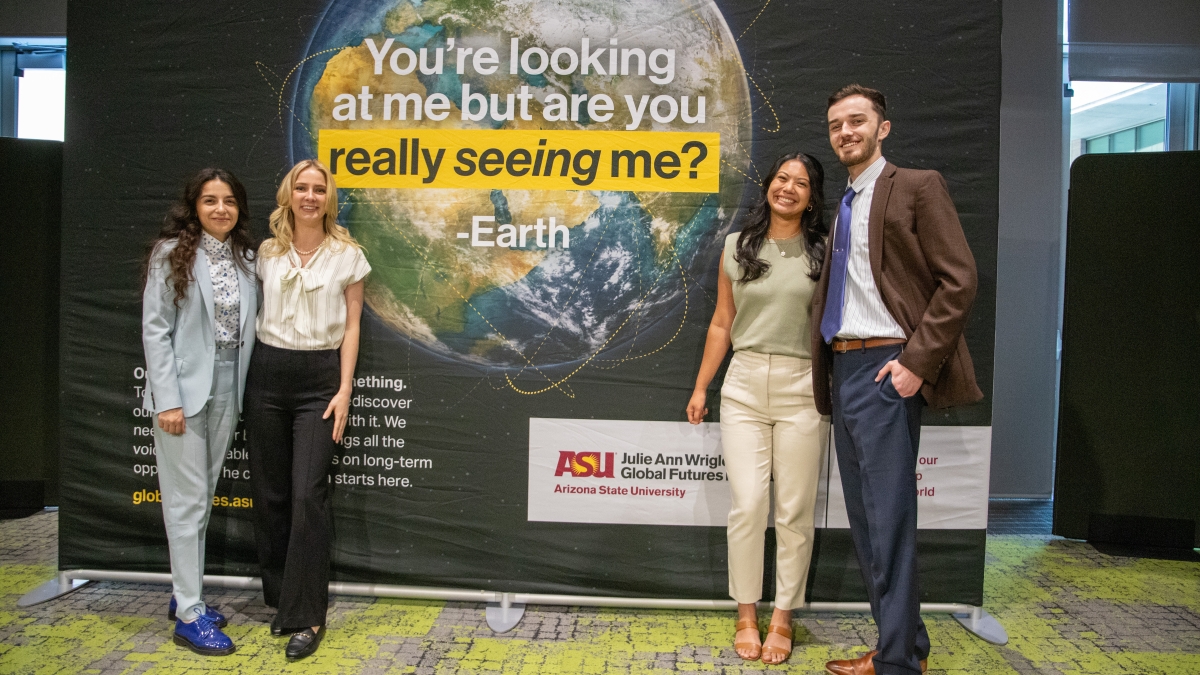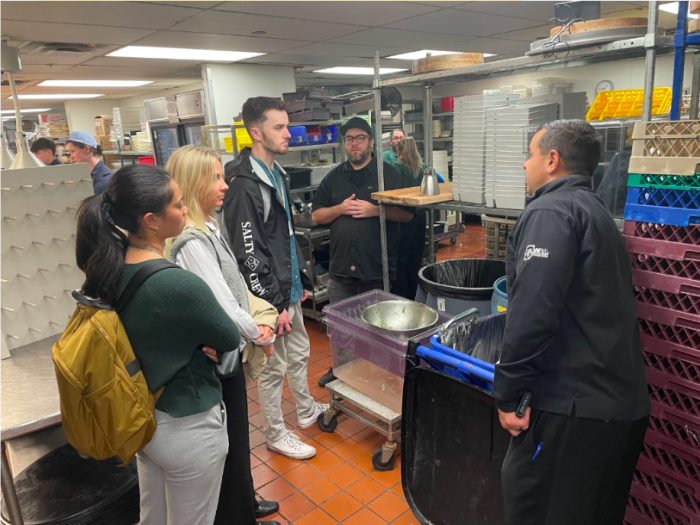ASU sustainability students tackle hotel food waste

Students of the Master of Sustainability Solutions program presented their capstone project on sustainable food waste management practices for their community partner, Fairmont Scottsdale Princess Hotel. From left: Ani Hanesyan, Jaclyn Reynolds, Chassidy Manlapid, Zachary Albregts. Courtesy photo
Graduating seniors from the School of Sustainability, a unit of the College of Global Futures at Arizona State University, showcased their innovative solutions for real-world sustainability challenges at the capstone project presentation held at the Walton Center for Planetary Health this spring.
The event featured presentations from five project teams, each collaborating with industry business and community partners to develop sustainability solutions such as food waste reduction, decarbonization for carbon-intensive products, sustainability communication, green career opportunities and mitigating environmental impacts in event planning.
Among this year’s community partners was Fairmont Scottsdale Princess Hotel, represented by ASU alumnus Michael Ortiz. He graduated from the university in 2009 with dual bachelor’s degrees in sustainability and business management and now works as the hotel’s process improvement and sustainability manager. Ortiz spearheaded the collaboration with ASU students to address the hotel's food waste issue.
Studies show that the U.S. wastes 92 billion pounds of food annually, valued at over $473 billion. This equates to approximately 38% of America's total food supply.
According to a World Wildlife Fund report, customer-facing businesses like hotels, restaurants and supermarkets produce an estimated 40% of food waste. This makes hotel kitchens ideal settings for implementing food waste management strategies.
The Fairmont Hotel has developed sustainability initiatives, such as reducing energy consumption, water conservation and sustainable sourcing, and it is seeking a sustainable solution for its food waste management operation.
“The challenge with the food waste project was to identify cost-effective strategies to minimize waste without compromising guest satisfaction,” Ortiz said.
The project spanned two semesters, with College of Global Futures students from the ASU Online Master of Sustainability Leadership program conducting research and return on investment analysis in fall 2023, followed by students from the Master of Sustainability Solutions program refining strategies for the hotel’s food waste management practices in spring 2024.
“The ASU students conducted a comprehensive analysis of our food service operations, uncovering key areas where waste reduction could also yield financial savings,” Ortiz said.
The team from the fall — which included Rebecca Auslander, Emily Magyar, Andrew Schuyler and Codie Sterner — highlighted opportunities in inventory management, portion control and composting initiatives that could enhance the Fairmont Hotel’s return on investment while contributing to their sustainability objectives.
“The Fairmont Scottsdale project allowed me to take the foundation I had built from the Master of Sustainability Leadership program and put the concepts to use,” Schuyler said.
The Master of Sustainability Solutions team’s project in the fall of 2023 developed into a multifaceted food waste reduction program for the Fairmont hotel, which included staff training, guest awareness campaigns and partnerships with local food recovery organizations.
“The response from our executives was overwhelmingly positive,” Ortiz said.
“Already, we have seen a noticeable reduction in food waste, an increase in staff engagement with our sustainability goals, and positive feedback from guests who appreciate our commitment to the environment.”
In spring 2024, the students of the Master of Sustainability Solutions team — which consisted of Zachary Albregts, Ani Hanesyan, Chassidy Manlapid, and Jaclyn Reynolds — worked on the second phase, incorporating innovative approaches to further enhance operational efficiency and reduce food waste.
The team, led by Ortiz, visited the Fairmont Hotel site to learn more about the hotel’s food waste management operational chain.
Courtesy photo
After initial research and site visits, the Master of Sustainability Solutions team learned that food waste has environmental consequences and long-term socioeconomic impacts. Therefore, they developed a comprehensive and effective sustainability solution based on financial and social considerations.
The student team found that there were areas of opportunity where food budgeting could be optimized. With high annual food costs, this finding highlights a major opportunity for financial savings and operational improvement. Meanwhile, from a social-impact standpoint, the excess food could otherwise be repurposed and/or donated to local charities.
By analyzing patterns in resource usage and guest behaviors, the team defined opportunities to improve operational efficiency and reduce food waste.
“The commitment and creativity displayed by the students in pushing the boundaries of what we achieved last semester is truly commendable,” Ortiz said.
The capstone experiences allowed both groups of students to apply their sustainability knowledge beyond the classroom by creating solutions with real-life impacts.
“In academia, we learn about sustainability principles and are introduced to people who share our passion, which helps us expand how we perceive the world and tackle problems, which is extremely helpful,” Magyar said.
“But even the best ideas in the world won’t get implemented if we cannot convince enough people to engage with the solution.”
The project also prepared students for careers in the green workforce.
“Since everyone on our team is considering a career path in corporate sustainability, this experience provided us with firsthand insight into how a company handles a complex sustainability problem,” Albregts said.
Ortiz shared that he was impressed with what both student teams accomplished for the capstone project, commending the tangible results it provided and the professionalism with which both teams conducted their work.
“They have approached the project with a level of maturity, dedication and analytical rigor that one would expect from seasoned professionals,” Ortiz said.
More Environment and sustainability

ASU prof turns trash into treasure
The Research Corporation for Science Advancement, or RCSA, regularly hosts a series of discussions known as Scialog, a portmanteau of science and dialogue. Created in 2010, the Scialog format…

Best outdoor experiences are shared and build connections, recreation professor says
Steve Sassaman doesn’t really need to tell you he’s an outdoorsman. One look at his full, dark beard gives a vibe that clearly says he knows which end of the kayak to put into the water first.While…

ASU offers new project-based courses for global leaders of tomorrow
Addressing complex challenges requires innovative solutions.This is why the College of Global Futures — with its four academic units including the School for the Future of Innovation in Society, the…
